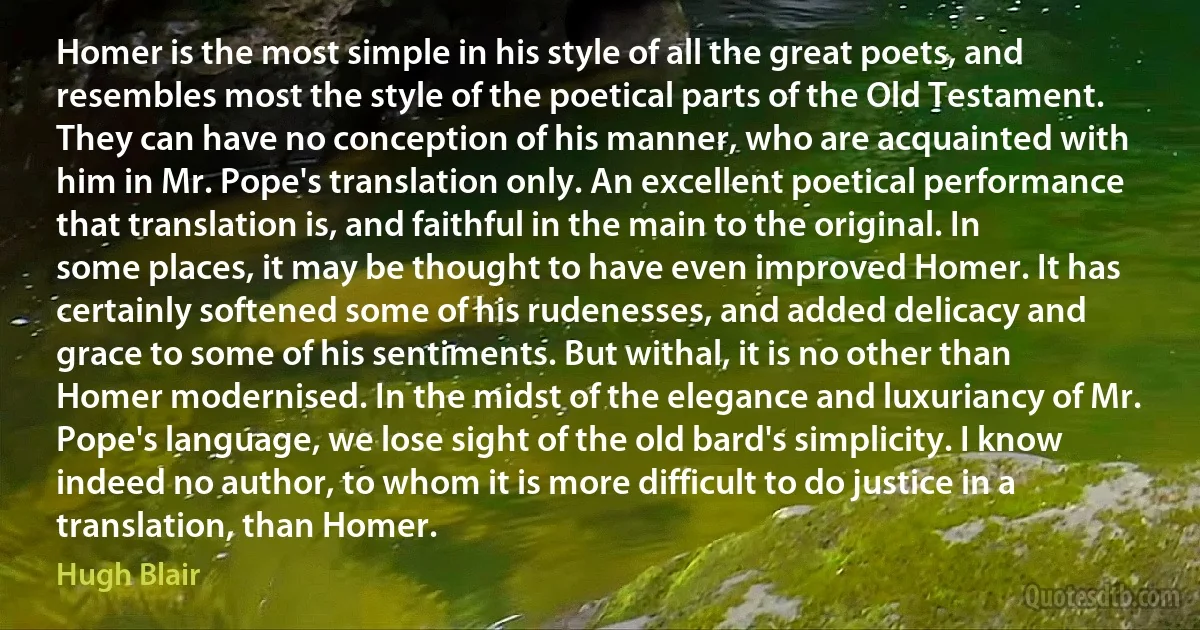
Homer is the most simple in his style of all the great poets, and resembles most the style of the poetical parts of the Old Testament. They can have no conception of his manner, who are acquainted with him in Mr. Pope's translation only. An excellent poetical performance that translation is, and faithful in the main to the original. In some places, it may be thought to have even improved Homer. It has certainly softened some of his rudenesses, and added delicacy and grace to some of his sentiments. But withal, it is no other than Homer modernised. In the midst of the elegance and luxuriancy of Mr. Pope's language, we lose sight of the old bard's simplicity. I know indeed no author, to whom it is more difficult to do justice in a translation, than Homer.
Hugh BlairRelated topics
conception elegance faithful grace great justice language lose midst sight simple thought partsRelated quotes
Each form of the sacrosanct was regarded by members of the culture which gave rise to it as a revelation of the Truth; at Byzantium it was not a mere hypothesis that was sponsored by the majesty of the Byzantine style. To us, however, these forms make their appeal as forms alone - in other words, as they would be were they the work of a contemporary (and, since this actually is unthinkable, they affect us in a puzzling manner); or else as so many grandiose vestiges of a faith that has died out. We look at them from outside; they are still emotive, but they are no longer true. Thus we deprive them of what was their most vital element; for a religious civilization that regarded what it revered as a mere hypothesis is inconceivable.

André Malraux
It is one of the most beautiful characteristics of Theosophy that it gives back to people in a more rational form everything which was really useful and helpful to them in the religions which they have outgrown... in this teaching as to the immortality of the soul and the life after death, Theosophy...does not put forward these great truths merely on the authority of some sacred book of long ago; in speaking of these subjects it is not dealing with pious opinions, or metaphysical speculations, but with solid, definite facts, as real and as close to us as the air we breathe or the houses we live in - facts of which many among us have constant experience - facts among which lies the daily work of some of our students, as will presently be seen.

Charles Webster Leadbeater
WHAT HAPPENS AFTER DEATH?
When a human soul goes out of the body, some great mystery happens. For if it is guilty of sins, then there come hordes of demons, evil angels and dark forces, take that soul and drag it to their side.
No one should be surprised at that, because if a man surrendered and fell prey to them while still alive in this world, will not they have even greater control over him and enslave him when he departs from this world?
As for the other, the better part of people, something different happens to them. There are Angels around the holy servants of God in this life; the holy spirits surround them and protect them; and when their souls are separated from the body, the choir of Angels welcomes them into their fellowship, into a bright life, and thus leads them to the Lord.

Macarius of Egypt
One, though he be excellent and the chief, is not to be imitated alone; for never no imitator ever grew up to his author; likeness is always on this side truth. Yet there happened in my time one noble speaker, who was full of gravity in his speaking; his language (where he could spare or pass by a jest) was nobly censorious. No man ever spake more neatly, more pressly, more weightily, or suffered less emptiness, less idleness, in what he uttered. No member of his speech but consisted of his own graces. His hearers could not cough, or look aside from him, without loss. He commanded where he spoke, and had his judges angry and pleased at his devotion. No man had their affections more in his power. The fear of every man that heard him was lest he should make an end.

Ben Jonson
If it were not my purpose to combine foreign things with things Greek, to traverse and civilize every continent, to search out the uttermost parts of land and sea, to push the bounds of Macedonia to the farthest Ocean, and to disseminate and shower the blessings of Greek justice and peace over every nation, I should not content to sit quietly in the luxury of idle power, but I should emulate the frugality of Diogenes. But as things are, forgive me Diogenes, that I imitate Herakles, and emulate Perseus, and follow in the footsteps of Dionysos, the divine author and progenitor of my family, and desire that victorious Greeks should dance again in India and revive the memory of the Bacchic revels among the savage mountain tribes beyond the Kaukasos...

Plutarch
